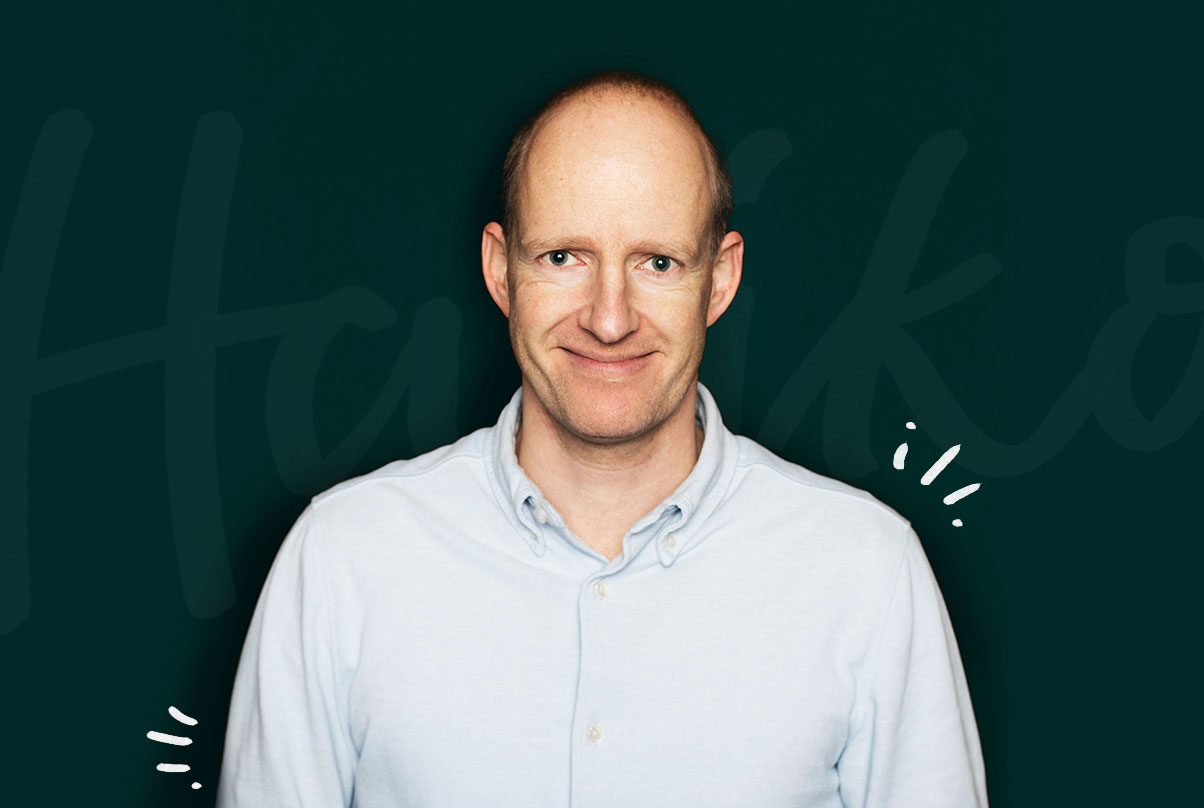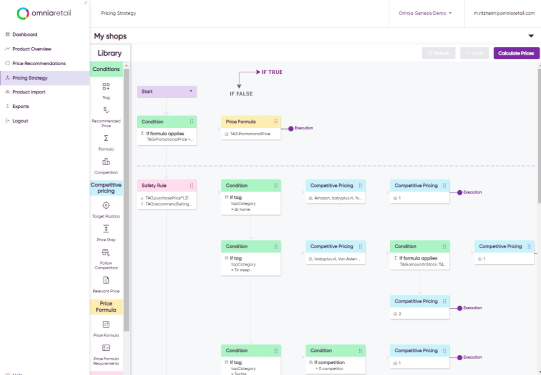Today we continue our Meet the Team series with Haiko Krumm, Omnia's Vice President of Customer Success by day, and adrenaline-fueled daredevil by night. With more than 12 years of experience in the world of Customer Success, Haiko's our go-to expert for making sure our customers get as much value out of their Omnia software as possible.
We sat down and asked Haiko about his career path, why he believes so deeply in customer success, and where he wants to take the company in the future.
Want to work directly with Haiko? We're hiring! Check out our Careers page to see our vacancies.
Hi Haiko! How are you?
I’m doing well, thanks!
Let’s get started with your role at Omnia. Can you talk a little bit about what you do here as the Vice President of Customer Success?
No problem. I think it’s helpful to start from my overall goal in the company, which is to help the customers get results with our product. To make sure customers achieve the results they want, we employ a Customer Success team that’s dedicated to helping customers reach their goals.
My daily job is to lead this team and infuse a “customer success” philosophy into our thinking. So I’m responsible for coaching and supporting our Consultants and Customer Success Managers, as well as hiring new people to care for our customers.
What did you do before coming to Omnia?
Right before I came to Omnia, I took a 10-month long sabbatical to relax a bit. I spent most of my time renovating my house, hanging out with my son, and spending time with my father, but between that I took a week of holiday each month. I also got my boating license during this time and my wife, son, and myself spent the whole month of August in Croatia, part of which was on a rented boat.
But before that my real job was at inSided, a SaaS platform I co-founded that helps companies scale their customer service teams and ensure customer success.
Tell me more about inSided. How did that start?
Before inSided, I was a marketing consultant doing customer contact, multichannel, distribution, customer experience, and digital transformation projects for larger enterprises. It was a nice job, but I was getting tired of my role. I wanted something that was more entrepreneurial and challenging than working for a large enterprise. You have to remember though this was back before “startups” were a thing, so it was harder to find that!
While on vacation in New York my fiancée gave me some insight and helped me realize I needed to start looking for a new job. And a week after we got back from New York, I saw a job opening for a “community manager” on LinkedIn. And while the job itself wasn’t a great fit for me, I decided to get in touch with the CEO of the company, Robin van Lieshout, to learn more about what the value was of a “customer community.”
At the time, “customer communities” were this new idea. Nobody really knew what to do with a customer community and while many companies liked the idea of a customer network, all the projects they ran to build and maintain them were unsuccessful. Everybody wanted to start a community, but nobody knew how to do that successfully.
But Robin saw differently. And he met me for lunch one day and explained how he used communities to grow. During that lunch I instantly understood the value of online communities, especially with a peer-to-peer service purpose, so, for example, customers helping each other with WiFi and mobile internet settings. And I learned that it only takes a small group of 'super users' to actually make a huge community with millions of visitors work.
Robin told me he wanted to shift his business model from managing his own community (and earning money with affiliate/bannering model) to facilitating communities for larger companies. He asked me to join some brainstorm sessions, and after the second brainstorm session he asked me to be part of this journey! I said yes, and I joined Robin and the other founder, Wouter Neyndorff, to build the company from scratch and make inSided a reality. Over the course of 7 years I grew to be Vice President of Customer Success.
You’ve been involved in Customer Success for a long time! Why do you care so much about this field?
Oh man, that’s a big one! I'm a huge customer advocate for a couple of reasons.
First, from a business perspective, customer success makes sense, especially in SaaS. SaaS customers don't buy your tool up front. Instead, they pay you to use the tool. And your company’s sales and marketing costs to get a new customer can easily cost as much that customer’s first year subscription fee. So a new customer only starts to contribute to your company and product growth after they’ve been a customer for a year.
But if a customer doesn't get value out of your product, they’ll cancel their subscription and stop paying for it. So if someone cancels after a year, you’ve basically only made back the cost of acquiring them, but not really any profit. If your customers get value out of your products, they stay customer and become brand advocates with great success stories that will help bringing new customers in. They’re also perfect candidates for cross sells and upsells, since they know your company and trust your product.
So it’s not about making your customers happy, though we want our customers to be happy, of course. Instead it’s more about making sure they find your product to be a valuable addition to their lives.
Second though, I also think it's just who I am as a person. I like to see people succeed. If I can help them along that journey to success, then it’s a good day, but it makes me happier to empower them to reach those goals themselves. I don't work for companies, I work for and with people.
How do you define customer success?
Like I said, Omnia is a subscription service, and we will only get value out of our customers if customers get enough value out of our product. So we need to make sure that customers achieve their goals with Omnia. And that’s the core of the Customer Success philosophy or mindset.
It starts with our product, which is the core of Omnia and only really scalable value driver. But everyone can contribute to customer success. Marketing, for example, can contribute by targeting the right customers with content that’s really helpful for prospects and related to our product. Operations is probably the team that contributes less directly, but also helps in hiring people with the right mindset and facilitating the basics like the office and administration.
What do you like about working at Omnia, and what’s your vision for the future of Customer Success here?
I like the phase we are in at Omnia because there are clear proof points of success, but also a lot to prove and improve. It’s an exhilarating stage in a company’s growth because there are so many things happening at once.
I also like the culture at Omnia, and everyone who works here is smart, social, and 150% dedicated to their specialty. It’s nice that the team is still small enough to really get to know everyone else.
In terms of my vision for what we’re going to do here, I really want to make more information about how to build pricing and marketing strategies in our knowledge center, as well as more information on how to get the most out of the tool. As a whole, Omnia wants to be the place retailers come to for questions about pricing and marketing, and I think empowering our customers to better understand the platform is a big part of that.
Next to knowledge, I’m also focusing on proactive customer success management. So that means really tracking customer health metrics like product usage, and also having periodic strategy sessions and executive business reviews to define the goals of the customer, track the results and give them insights and inspiration.
As the Vice President of Customer Success, you lead the consultants, onboarding manager, product specialists, and, of course, the customer success managers. How do you define your leadership style?
I follow a "serve first, lead second" mentality. I do my best to make sure that I'm helpful to everyone on the team and that everyone has the tools and support they need to succeed.
I also try to get to know everyone on a personal level, because I don't think it's possible to truly separate your personal life from your work life. I want to be able to connect with my colleagues on a personal level and understand who they are, not just what they do at work.
What do you look for when looking for new teammates?
I think the biggest thing I look for is a willingness to learn from mistakes. One of the greatest things about Omnia is that we operate fast, and we hire for expertise. As a result, we trust our colleagues to do their best work, make informed decisions, act quickly, and be forward-thinking.
This means there's a lot of responsibility on all of our shoulders, but it also doesn't mean that we can't make mistakes. We're all always making mistakes because we're human! Instead of pretending we're infallible, we should welcome those mistakes as an opportunity to learn and grow.
Along these lines, I also really value honesty. I want people that I can give honest feedback, but who will also return the favor. I tend to fit the mold when it comes to Dutch honesty, so I won’t embellish something or pretend that something’s okay when it isn’t.
Now for the fun part! What do you like to do outside of work?
I love to do sports, especially anything that really gets the adrenaline pumping! Some of my favorites include skiing, kite surfing, mountain biking, and motorcycling.
Besides that though, I also love spending time in Amsterdam and relaxing with my wife and son. I've lived in the city center for the last 15 years and there's no place in the world I'd rather be.
Last question. Do you have any book recommendations for people interested in Customer Success?
For sure. There are three that stand out to me. From Impossible to Inevitable by Aaron Ross and Jason Lemkin is great, and so is Multipliers by Liz Wiseman.
But if you want my “Bible” you should check out Customer Success by Nick Mehta, Dan Steinman, and Lincoln Murphy.





